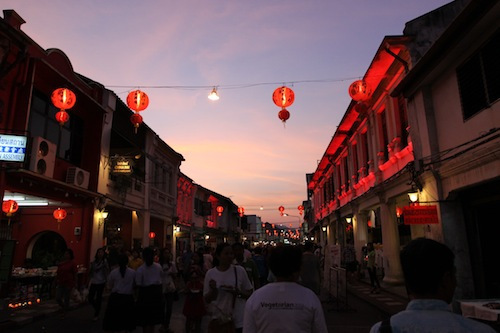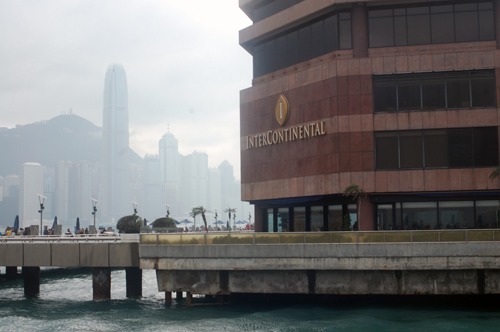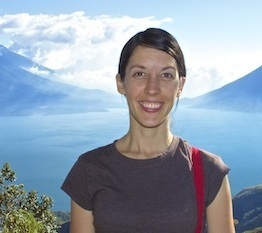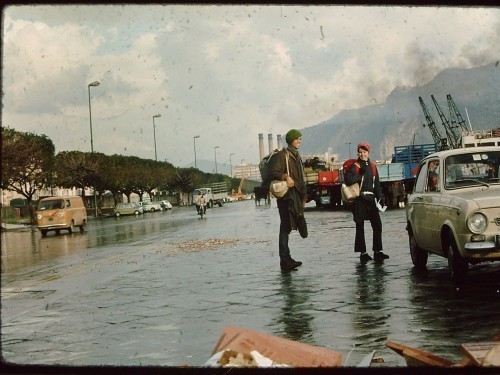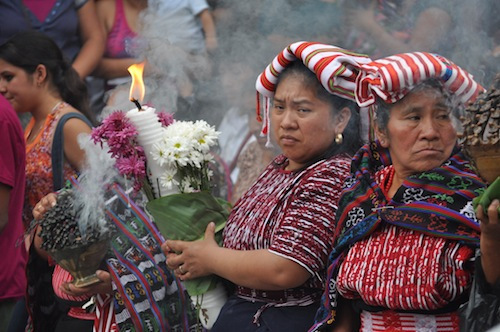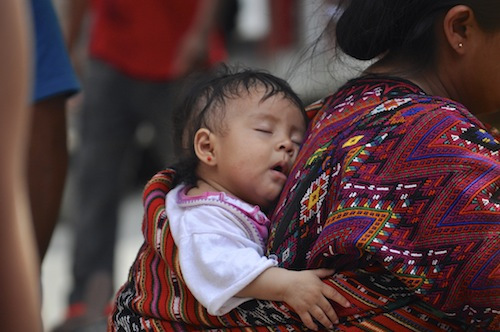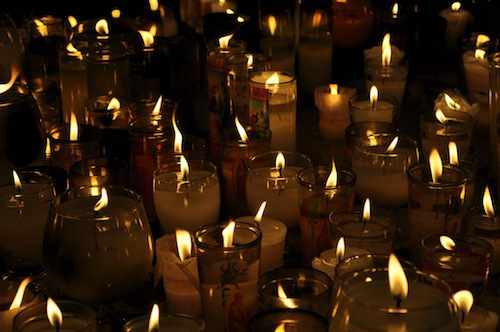Rolf Potts's Blog, page 46
March 17, 2014
Vagabonding: An invitation to a book club
Vagablogging :: Rolf Potts Vagabonding Blog
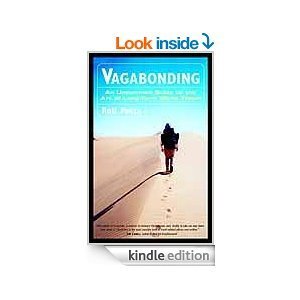
I first read Vagabonding in 2006, when we were in the throes of planning what we expected to be a one year trip. I was devouring everything I could find for inspiration, looking for the tools I needed as we grappled with breaking free from a very “normal” American life and plunging into the unknown, with four kids in tow. I’d read books specific to every aspect of packing, cycling long distance, travel with children and life on the road, and I had a binder full of notes.
Then, I cracked the spine of Vagabonding: An Uncommon Guide to the Art of Long-Term World Travel, the dust settled around me, a calm descended, and I remembered something very important: our journey wasn’t about preparation, it was about perspective, and we weren’t headed out on a lark, we were embarking on a lifestyle. Of course the book handed me tools, it’s chock-full of resources to build on, but more importantly Rolf sung the timeless song of the vagabond for our generation. He articulated the age old messages of light-footed simplicity in a way that our modern minds recognized.
I decided, a few weeks ago, that I need to re-read this book. I’m six years in to a lifestyle of full-time travel and it’s now “routine” for me. Taking over as Managing Editor of this site has required me to dig deep into 11 years worth of content on a subject near to my heart and it’s reminding me of all of the best reasons that I’ve chosen the life I have. As I seek to refocus this blog on the core values of Rolf’s book I’ve found myself, yellow highlighter in hand, turning pages and rediscovering the beauty the philosophy of Vagabonding.
And so, I wanted to invite you to join me. For the next ten weeks I’m going to move, chapter by chapter, through the book and post some of my highlighted bits here. Starting now, with Chapter One. If you don’t have a copy, you have lots of choices: paperback, kindle, audio, among others. It’s even available in several foreign languages if you look!
So here we go…
Chapter 1: Declare Your Independence
“Ultimately, this shotgun wedding of time and money has a way of keeping us in a holding pattern. The more we associate experience with cash value, the more we think that money is what we need to live. And the more we associate money with life, the more we convince ourselves that we’re too poor to buy our freedom. With this kind of mind-set, it’s no wonder so many Americans think extended overseas travel is the exclusive realm of students, counterculture dropouts, and the idle rich… Vagabonding is not a lifestyle, nor is it a trend. It’s just an uncommon way of looking at life–a value adjustment from with action naturally follows. And, as much as anything, vagabonding is about time–our only real commodity– and how we choose to use it.”
This jumped out at me because it draws our attention to time as a commodity and the wrong thinking that has lead us to connect it to money in the economic sphere. One of the things long-term travel has taught me, over and over, is the truth of that last assertion: that time is our only real commodity and how we use it is a choice.
Please share your reflections on Chapter One in the comments!
Original article can be found here: Vagabonding: An invitation to a book club
March 16, 2014
When you travel, a new silence goes with you
Vagablogging :: Rolf Potts Vagabonding Blog
“When you travel,
A new silence
Goes with you,
And if you listen,
You will hear
What your heart would
Love to say.”
–John O’Donohue, “For the Traveler” (2008)
Original article can be found here: When you travel, a new silence goes with you
March 15, 2014
Exploring Phuket: The heart of the dragon
Vagablogging :: Rolf Potts Vagabonding Blog
Perhaps the evenings are what captivate me the most, when the heart of the island basks in the falling light. People hurry home from work on their motorbikes, picking up food from the market on their way. No tourists can be seen, save by the hostels and Western style bars, but they are few surrounding the Thai haunts that I like to frequent.
Every night my daughter and I take a walk from our home in Phuket Town to a local café we have become accustomed to frequenting on a daily basis. Our walk is filled with magical stops where she points out a house shrine or perhaps a stone dragon outside an internet café. We say hello to the chickens and other birds we find on our path, as well as some fish that swim in the flower pot outside the bank. We savour the simple, magic filled moments that are what make Phuket special to me.
Perhaps I have blinders on but here in the heart of the dragon, you won’t find throngs of tourists like in Patong or Kata. You find authentic Thai food and no fancy hotel style cocktails. Sure you will see some souvenir shops selling knick knacks and Baba influenced clothing that the random backpacker or lost farang look at, but that’s about it. Those of us expats who live here are the odd ones that have lost much of our original culture and do our best to avoid being treated like a clueless tourist. We know our neighbors and where the best places are to eat. We do our best to learn Thai, as bad as our pronunciation may be.
And most of us don’t like Patong whatsoever.
I completely understand why the well traveled soul dislikes Phuket as they equate it with Patong, the Disneyland of the island. Even Chalong is becoming oversaturated with foreigners, as are Rawai and Naiharn. But even in the apparently tourist heavy parts you can still find Thais, many of whom commute to Phuket Town to work and shop.
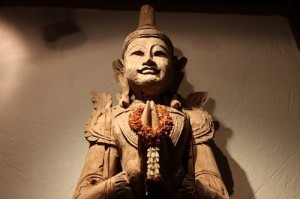 Here’s the deal: Phuket has a unique culture and in order to experience this Thai and Chinese influenced spirit, you simply leave the tourist traps and go to other places, such as Jui Tui Shrine or Saphan Hin. Instead of going to a farang bar, copy the Thais by buying a few Leos and heading to the park or Chalong Pier to sit by the water and watch the late night fishing while listening to Thai rock blaring from someone’s phone. Sabai Sabai to the max.
Here’s the deal: Phuket has a unique culture and in order to experience this Thai and Chinese influenced spirit, you simply leave the tourist traps and go to other places, such as Jui Tui Shrine or Saphan Hin. Instead of going to a farang bar, copy the Thais by buying a few Leos and heading to the park or Chalong Pier to sit by the water and watch the late night fishing while listening to Thai rock blaring from someone’s phone. Sabai Sabai to the max.
Instead of going to Starbucks, maybe head to the infamous Kopi De Phuket for a coffee and tea fusion popular with the locals. Maybe seeing a bunch of drunk people super soaker eachother is also not your cup of tea ( I won’t judge you) so instead check out the Vegetarian Festival in October. You’ll love the ceremonies and come home sober.
Thai cuisine may be synonymous with Bangkok street food ( and for good reasons) but you’ll still find reasonably priced, delectable Southern dishes in Phuket. I take pride in avoiding Western fast food restaurants ( which mind you are actually more expensive here than Thai food) and pick up something from the local Thai market, such as gang som pla or a quick khai jiaw doused with prik nam pla.
I’ve tried to leave Phuket a number of times, convincing myself that perhaps Bangkok or Krabi would be best for us. So far our moves have proven unsuccessful and we still remain proud Phuketians, savoring simplicity and avoiding the tourists while slowly but surely finding our place within this culture.
E.K. Bradley is a travel writer and photographer stalking chefs in Phuket. She writes about family travel on Sattvic Family and shares her culinary escapades on Epic Wanderings .
Original article can be found here: Exploring Phuket: The heart of the dragon
March 13, 2014
Vagabonding Case Study: Jack Cooke
Vagablogging :: Rolf Potts Vagabonding Blog
 Jack Cooke
Jack Cookehttps://jackandkateaus.wordpress.com/
Age: 27
Hometown: Bristol, UK
Favourite Quote: ”Dream as if you’ll live forever. Live as if you’ll die today.” (Bit Cliche but it resonates with me)
How did you find out about Vagabonding, and how did you find it useful before and during the trip?
Vagabonding I knew as a term more than the website until I spoke to Jennifer Miller. I am currently listening to the audiobook.
How long were you on the road?
I’m on the road as you read this and will be until the day I have to stop, if I pursue the path I desire and can sustain the funds I need to keep me moving then who says I will ever stop.
Where did you go?
Several years prior to my great Australian travels I spent a few months travelling Europe. I did this alone because of my need to move out of the bubble that my life was enclosed in. I felt the world was too small to not be explored. Now several years later and I am on the road across Australia. I began by road tripping the lower East Coast from Sydney to Adalaide and on to what I describe as “postcard” Australia to the middle of the red desert, Uluru (Ayres Rock), the beautiful destination at the heart of the Outback. Today as I write this I am touring Sydney to Cairns.
What was your job or source of travel funding for this journey?
Did you work or volunteer on the road?
Me and my travelling partner, best friend and fiancee Kate fell in love with Uluru and took up a couple of kitchen and food and beverage roles at the Ayres Rock Resort. This has to be the best place I have had the opportunity of working at.
Of all the places you visited, which was your favourite?
Uluru (Ayres Rock) will always be close to my heart, the friends we made and the time well spent have been some of the best months of my life. However, besides waking up each morning and seeing the maginficent rock, it was the chance to explore and learn the Aboriginal and Indigenous culture. We learn very little in the UK about what I deem a very relevent piece of our own history. I took every chance I could to engage, learn and ask about the culture and what it means to the local Anangu people and other native Australians. I feel I could read every book on offer but nothing could give me the amazing knowledge I learnt whilst living amongst these great people.
Was there a place that was your least favorite, or most disappointing, or most challenging?
My least favourite place to visit was Melbourne, if I’m honest. I want to give it another chance as many travellers and natives have argued in its favour. Im not a fan of big cities to begin with. I felt it was over sold to me before hand. We gave the place a chance and spent 3 days there. It rained for almost two and a half of those 3 days. It was busy and I felt it showed no real Australian culture, it felt like London or Paris or any other big city. I wanted to find places that have their own identity, I felt I needed a purpose to be in a place rather than feel like I could be in any other major city in the world.
Which travel gear proved most useful? Least useful?
Useful travel gear? I could easily say a phrase book, travel guide, tablet etc. If I’m honest a small bag will always be your friend if you can put a phone, passports and money in it you’ll never be stranded, that’s how I see it. What else would you need? You can put a bottle of water in it and go for a walk, put your sandwiches in it and stroll around town, carry a good book and find a spot to read. As for least useful? This was our solar shower that we were quite proud of when we purchased it back in the UK. Australia is so travel friendly many rest stops or public areas will have showers. Not to say a solar shower wouldn’t be useful only we had no need for it.
What are the rewards of the vagabonding lifestyle?
Vagabonding is living at its best, you live a simple life whilst living to a full and experienced lifestyle. You have no ties to anything, no 9-5 life. If you want to go somewhere, do something, its only you who can say no. You also learn to adapt if you need something be it money, food, travel etc you will always find a way; something the modern and western world have lost as a survival instinct. As soon as I began my travels the stresses of my previous life lifted and the burdens I had at home were left far behind.
What are the challenges and sacrifices of the vagabonding lifestyle?
The challenges of vagabonding will always be the funds. The capability to pay for each step of your journey. If you’re lucky and have won the lottery before you set off on your journey then you’re probably not going to be able to go forever without having to reimburse your funds. This however is part of the fun. The couple of jobs I have taken on since beginning this have been fun, new and great experiences. I have had to learn something new, something out of my comfort zone in order to make some money. The sacrifices you make are the time spent away from family. This has to be for me the hardest part, but the internet and use of mobile technology has made the world smaller in terms of communication.
What lessons did you learn on the road?
The best lesson I learnt was the value of money. When you’re on holiday you can spend what you like – if you run out you’ll still be on that plane going home and have money in your bank next payday. However with travelling you have what money you have and until you pick up work you need to understand where your money needs to be spent. This doesn’t mean you can’t enjoy it, it’s more about spending it wisely. It helps you to realise what simple pleasures are and how to enjoy certain luxuries as treats rather than taking them for granted. The greatest thing you could do is earn as you go and find a way you can make money with what you have. This is where I really could have done with guitar lessons many years ago!
How did your personal definition of “vagabonding” develop over the course of the trip?
My personal definition of vagabonding is this – it’s the life of a nomad wrapped up in wonderful experience after wonderful experience. It’s not a hard life to lead once it begins and is enriching and fulfilling for mind, body and soul.
If there was not thing you could tell yourself before your trip, what would it be?
The one thing I would tell myself now, just as I would say to any would be travellers is just relax, don’t worry. Dive in and get lost in the experience. Learn everything you can along the way, and if any problems arise you will always find a way to solve them.
Any advice or tips for someone hoping to embark on a similar adventure?’
First would be to book the Flights/Coach/Train for 6 months, 1 year or however long you need from now. I found I would talk about it and procrastinate, find an excuse not to go and put the whole journey off. By booking my flights I had made the biggest step happen – I gave myself a deadline. I would say this to any would be travellers – book your travel, giving yourself enough time to raise funds, plan and tie up your loose ends. Only then would your ideas come into fruition and you will be counting down the days to a new life.
Second tip is don’t rely on the unreliable. Great plans often get made around a pub table. I found I had been let down several times by friends who would promise to talk seriously about plans to travel. These plans were often left at the bottom of a beer glass and your dream gets left by the wayside. Find someone with your passion who will commit, if not be prepared to go it alone. There will be like minded people out there, just don’t let anyone else ruin your ambitions.
When and where do you think you’ll take your next long-term journey?
My next travels, I expect, will be Asia. We are both qualified in TEFL and would like to learn and explore Asia as a continent. Moving on from here to South America. For me this is partly due my interest in Che Guvera the Argentinian revolutionist, and the great read Motorcycle Diaries. How and when this will happen is yet to be seen but why do I need rush?!
Website: https://jackandkateaus.wordpress.com
Are you a Vagabonding reader planning, in the middle of, or returning from a journey? Would you like your travel blog or website to be featured on Vagabonding Case Studies? If so, drop us a line at casestudies@vagabonding.net and tell us a little about yourself.
Original article can be found here: Vagabonding Case Study: Jack Cooke
March 12, 2014
Learning how a luxury hotel can stretch your travel-funds more than a hostel
Vagablogging :: Rolf Potts Vagabonding Blog
It is odd to realize that a luxury hotel can be the means for budget travel, and therefore, sustainable travel for my husband and I. But strange as it sounds, we have found this to be the case.
For instance when we arrived in Venice a few weeks ago and needed a place to stay, (after a bit of internet time), we found ourselves at the Westin Venice, a five-star hotel just around the corner from St. Mark’s Plaza. We found ourselves here not because we have high standards for comfort and quality, but because we are cheap- too cheap to pay $20 a bed for a hostel when we could stay at the Westin for free.
Now, certainly hostels serve a unique purpose for lone travellers that is tough to find elsewhere. For instance, in a hostel you are sure to find other travelers and thus, some of the anxieties that can come along with lone-travel might be eased. It is tough to find such a community atmosphere elsewhere.
And yet, my husband and I will pick a hotel over a hostel every time. Our reasoning can be summed up in just two words: “Rewards programs.”
While this strategy may cost very little cash, it does cost quite a bit of research and strategy. In this article I’d like to start that research process by discussing what rewards programs are, how they work, and how they can end up stretching out your travel funds.
What are rewards programs and how do they work?
Chain hotels will often create a program that offers its customers an incentive for remaining loyal. (Thus, these rewards programs can also be called loyalty programs.)
Most often in the hotel industry these incentives are given in the form of hotel points. For every dollar you spend with the hotel, you receive a point (sometimes more and sometimes less depending on the situation) that you can put towards a free night witht he brand in the future.
These points may feel like they accumulate slowly, but there are a few ways to speed up that earning process through promotions. We won’t go into that now, but you can read more about the role promotions play in our strategy for full-time travel.
Really there are two basic ways to collect these hotel points.
1.) By being rewarded for your paid stays, as mentioned above (with or without a promotion to speed that earning along).
2.) By signing up for that hotel’s credit card. For example Starwood (the hotel chain associated with the Westin hotel mentioned before) offers a credit card with a 25,000 point bonus, achieved after spending a certain amount on the card within a certain amount of time.
If the mention of a required amount of spending between you and your bonus makes you nervous, there are tricks for that too. While it’s a bit complex to introduce in this article, you can read more about the tricks for reaching spend requirements here.
How do these rewards programs make it possible for a luxury hotel to be a cheaper option than a hostel?
1.) Points
The primary reason we’ve opted for hotels over hostels is because many luxury hotels are part of a chain, and as I mentioned above, many chain hotels offer you reward programs that open the door for spending something other than money- points.
2.) Earning
A hostel has never decreased my nightly rate because I’m a return customer. When we go to a hostel, we pay per bed, perhaps we buy a locker too and perhaps we pay for internet on top of that. Then, when our stay is finished, we go on our way and that money is gone.
When we stay with a hotel that has a loyalty program, even if we are spending money, we’re buying more than our room for the night. We’re buying a small piece of another night.
The best way to make this work for your benefit is by paying for stays at the cheapest hotel the brand has to offer. For instance if we see a Holiday Inn for $50, we’ll stay there knowing that we’ll earn points that can be spent at the nicest hotels in IHG’s brand if we’d like. IHG is actually a wonderful example of this process because of a promotion they offer called “PointBreaks.” During this promotion IHG releases a list of hotels whose price in points will be discounted severely, including some very nice luxury hotels. (Read more about IHG’s PointBreaks promotion here.)
3.) Location
Luxury hotels like to grab up the best property they can find, often making them quite central to any kind of attraction you might be in town to see. And centrality will save you money. In the Venice example I mentioned above, our central location allowed us to avoid taking a daily bus into Venice.
On another occasion, we stayed at a five-star hotel in a prime location in Kowloon, HongKong. Thanks to our location, we were within walking distance of the evening light show.
Conclusion
While it takes a bit of a strategic approach, my husband and I have made this our primary strategy for long-term travel. Since beginning our pursuit of the nomadic life two and a half years ago, we’ve stayed at 74 four or five star hotels for free.
In my mind this statistic is not impressive because of the luxury but rather because of this: 74 free nights means 74 more days of exploring this beautiful planet.
Original article can be found here: Learning how a luxury hotel can stretch your travel-funds more than a hostel
March 11, 2014
Vagablogging Field Report: Extreme Bungee Adventure in Guatemala
Vagablogging :: Rolf Potts Vagabonding Blog
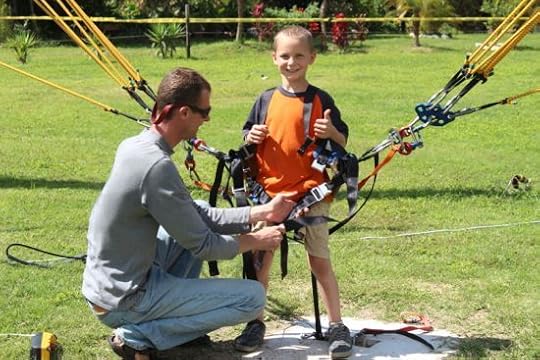
Cost: $22/adults $12.50/kids
What’s the coolest thing you’ve done lately?
Extreme Bungee!! Get strapped into a harness and shot into the air with up to 4G forces pressing against your body… basically you’re a human catapult. That’s extreme bungee.
 Describe the experience:
Describe the experience:
We are picked up by Lionel who owns and runs Xtreme Bungee. He drives us a few minutes outside of Antigua where he has an incredible human catapult machine set up.
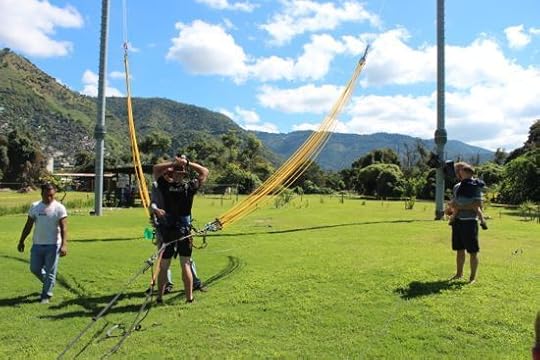
One by one, all the members of my family (except for the two youngest and me, the pregnant mommy) take turns being shot into the air, reacting with screams and funny facial expressions while G forces press against their bodies and free falls turn their tummies. (The video is hilarious!)
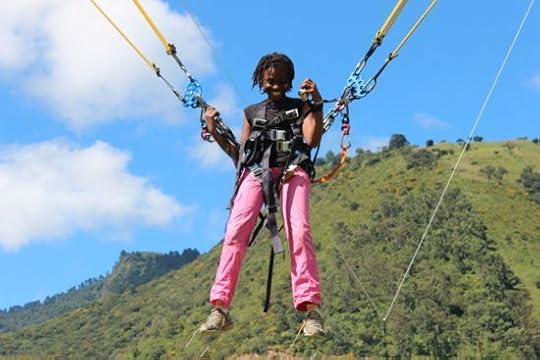
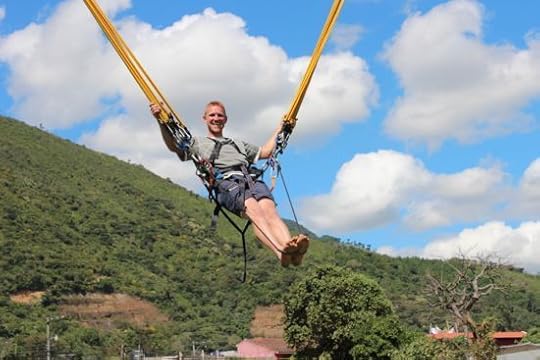
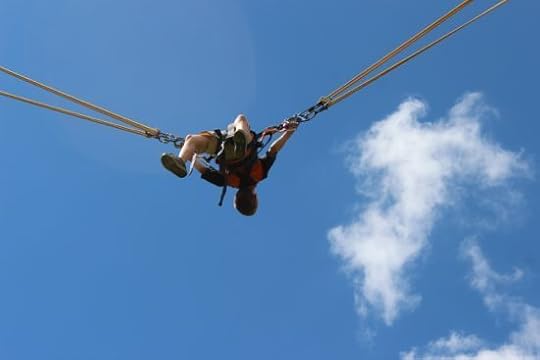
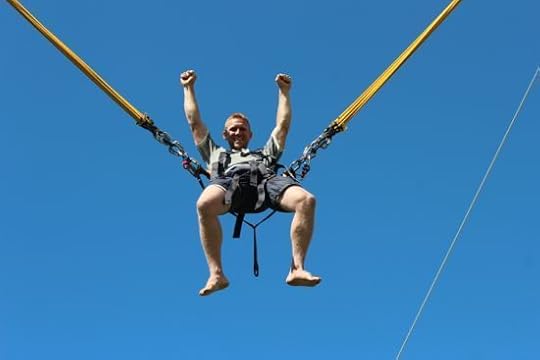
What do you like about the experience? Dislike?
I loved watching my kids and husband as they experienced something new and faced (and overcame) fears and uncertainties in order to create great memories, build confidence and have unexpected fun!
I did not like the music that was played at the site. It was in English and inappropriate for children. However, the owner has since stated that he will be more aware of that in the future.
Describe a challenge you faced:
Convincing my oldest son that he could not have more than two turns!
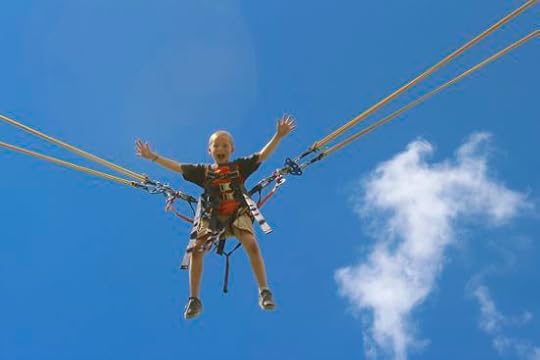
What new lesson did you learn?
Giving children an opportunity to get out of their comfort zone and try something new is ultimately what travel is about. It helps their confidence to grow, and expands their minds.
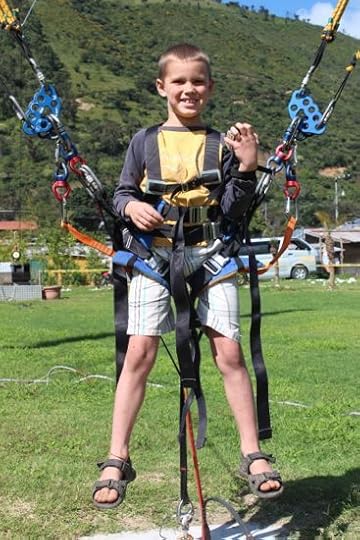
Where next?
Next we’ll be heading to El Salvador.
See more family travel adventures on my blog, or connect with me on Facebook.
Original article can be found here: Vagablogging Field Report: Extreme Bungee Adventure in Guatemala
March 10, 2014
5 Apps to aid your travels
Vagablogging :: Rolf Potts Vagabonding Blog
I have to admit that I am not a techno-junkie. I resist the pull of technology assiduously, but even I am forced to admit that there are some really fantastic new “toys” out there that make travel easier and provide possibilities for the independent traveler that didn’t exist in the era of paper maps.
Mtrip provides travel guides for 28 major cities including customizable itineraries, your own points of interest and ratings, create postcards to share via FB or email. Features include off line maps and navigation, up to date travel guides and the ability to keep a trip journal in the app.
Tourpal allows you to purchase individual tours of places in the cities you’re going. Walking tours, museum tours, river tours and more, in multiple languages. They can be purchased one at a time, for far less than an in person tour, and you’ve got the freedom to do it “your way.”
I recently discovered TripIt and I’m in love. It lets me email my confirmations and travel plans and the app creates a personalized itinerary, keeping all of my trip details in one place. I can add my own photos and maps and share my itinerary with friends and family.
Struggling through language barriers is one of the hardest parts of traveling. Stuck on the border of Myanmar, trying to secure dinner and lodging for our exhausted tribe, a local lady rocked our travel world by pulling out her ipad, firing up Google Translate and asking, “You look lost, how can I help you?” There’s no question that technology has changed how we travel, and there are debates about whether those changes are a benefit or a detriment over all. Debates aside, there are moments where it is an absolute godsend.
I’m a mom, so I have to throw in one for the kids. Bound Round is a fun travel app for kids. It will maximize their learning and engagement even before you take off. The passport feature makes a game of exploring a new place, and your kids can even keep their travel journal in the app. They can send virtual postcards to their friends with their own pictures and rate destinations for other kids.
So, what about you? What are your favourite apps for travel?
Original article can be found here: 5 Apps to aid your travels
March 9, 2014
Gideon Lewis-Kraus on the idea of pilgrimage as pretext
Vagablogging :: Rolf Potts Vagabonding Blog
“Part of what interested me so much about pilgrimage as a concept—what made me think it might work as a structure to hang a bunch of other stuff (questions of restlessness and purpose and forgiveness) on—was that, the more I read and talked and thought about it, the more capacious the idea seemed: Pretty much anything can be described as a pilgrimage. People talk about pilgrimages to Graceland or Cooperstown, or to see Saturn Devouring His Children at the Prado, or just to Flushing to get good soup dumplings, so one of the challenges I faced was how to limit the discussion. There’s a whole bit in the book where I talk about why, for example, I chose not to convert to Islam to go on the hajj. But what it ultimately came down to, for me, was the idea of pilgrimage as pretext: It’s an arduous (which, obviously, means very different things to different people, but the implication is at least some minimal experience of inconvenience or austerity) trip where the eventual arrival is generally besides the point, at least in retrospect.”
–Gideon Lewis-Kraus, interviewed in World Hum, April 25, 2012
Original article can be found here: Gideon Lewis-Kraus on the idea of pilgrimage as pretext
March 7, 2014
Is it still OK for Americans to travel overseas?
Vagablogging :: Rolf Potts Vagabonding Blog
Some questions just never get old.
This question came in almost eleven years ago from a reader. Rolf’s answer is as applicable today as it was over a decade ago. Do you wonder if it’s still safe to travel?
I got an interesting question from a woman in Texas. The gist of it was this: With all the news of war and anti-Americanism abroad, is it still OK for Americans to go vagabonding?
This is what I told her:
“The short answer is: Yes, it’s still safe for Americans to go vagabonding. Despite the impression you might get from the news media, the world is still an inviting place for travelers of all stripes — now as much as ever. You’d never guess this from watching the evening news, of course, but travel allows you to see the world a way that traditional news media never will. If you need a little encouragement in this regard, just check out traveler message boards at BootsnAll or Lonely Planet. Listen to dispatches from Americans abroad (including a recent one from France by humorist David Sedaris on public radio). Email your friends traveling overseas and ask how they’re faring. Without exception — from Egypt to China to Peru — the refrain I’ve heard (and seen — I’m in Thailand right now) has been this: people around the world may vehemently dislike George Bush’s bellicosity and/or American foreign policy, but they invariably treat Americans with respect and humanity.
“The only catch here is that you, as a thoughtful American traveler, must return that respect. Even if you collect George Bush memorabilia and derive your self-esteem from American foreign policy, your job as a traveler isn’t to argue and pontificate, but listen to what people overseas are saying (this goes for anti-war liberals as much as pro-war conservatives). Ask questions. Learn. Grow. You might go into a country worried about how you are perceived as an American (as I was a couple years ago in Syria and Palestine), but you will invariably come out with new and encouraging perspectives. That is one of the charms of travel.
“Admittedly, there is no such thing as risk-free travel. Guidebooks warn against crooked cops in Mexico, bad roads in Mozambique, and aggressive monkeys in Myanmar. Various websites, such as the U.S. State Department Travel Warnings (which you should definitely peruse when researching your travels), detail hazards in countries worldwide. But keep in mind that even these are worst-case scenarios. Statistically, you are no more likely to come into harm traveling overseas than you are walking across your hometown. Be careful on the road, but not paranoid. Engage local people and travel in such a way that you benefit local economies. And, as much as anything, exercise your humility as you walk through the world — a strategy sure to win hearts and minds everywhere.”
What are your thoughts? How would you answer the question?
Original article can be found here: Is it still OK for Americans to travel overseas?
March 5, 2014
Is there really such a thing as “us” and “them”?
Vagablogging :: Rolf Potts Vagabonding Blog
As we travel around the world, one of our most important goals is to connect with people and find out what common threads exist that bind humanity together. It is so very easy to categorize people and to explain away the worlds ills with generalizations and dinner table chats on politics.
But who are the individuals who inhabit our earth? Who are the people we talk about dismissively during those dinner table chats, sandwiched somewhere between the main course and dessert? How are they affected by the grander conflicts of our world? What do we have in common with them?
Does the key to changing our worst behaviors as a species lie solely in seeing people as individuals who are very much like us?
Recently, I had the honor of meeting a woman named “Katerina”, who chose to share her experiences during a very dark period in Guatemala history- a period many have categorized as genocide. Her experience is her own and her perspective is uniquely hers, though many suffered in a similar fashion.
The period in Guatemalan history Katerina talks about is very recent history. It was a period of brutality fueled by politics that affected the lives of every Mayan, every Guatemalan, at the time. Out of sheer panic over the possible spread of Communism, the US played a now well-known role in the events during this period, supporting a brutal regime and fueling anti-indigenous sentiment in the country. Guerrilla groups cropped up (some backed by Cuba) and, in their zeal to fight brutality from government backed groups, often tormented the local populace in their own right. The results were catastrophic with hundreds of thousands of people killed or “disappeared” and many more tortured and brutalized.
I was barely alive when this all took place but, as an American, I cannot help but feel remorse and utter helplessness over the horrific experiences Guatemalans were forced to endure due in part to my country’s politics.
Katerina said, in part:
“They would come in the night. They would burn buildings and start fights. No one had arms to protect themselves but they would still come. They would kill men, women, and children- they didn’t care. It didn’t matter if they were guerrillas or military, they were all the same.
My family was one of the lucky ones. There were police in disguise all over our village but my family had no one with the guerrillas so we escaped much of the problems. People where I lived were always afraid. The military was always demanding free food that we could not afford to give. They would rape our women; kill people as they went about their daily lives. My mother protected us fiercely and somehow, none of the females in my family was ever raped. The guerrillas were always causing problems and they were not much better than the military and police officials.”
Can you imagine what she is saying for a moment? Close your eyes and imagine strangers coming in the night and killing your child. Now imagine those strangers are dressed in the military uniform of your own country. Imagine that the greatest achievement you reach as a mother for over a decade was in protecting your girl children from being raped. Imagine, on top of all of this, that you have absolutely no idea what is going on.
“In Chichicastenango, there were military and guerrillas everywhere. No one knew where these people were from, they were strangers. The guerrillas dressed in the typical, local clothing of the Mayan people in Chichi and so the military was constantly coming after the Chichi people. But these guerrillas were not from Chichi, they were strangers who dressed like the Chichi people to fool the military. No one in Chichi knew who they were. It was very dangerous for the local people.
In the time of the guerrillas, there were still a few foreigners coming in and out of Guatemala. A friend used to drive these foreigners from Guatemala City to the Panajachel area. Along the highway between Guatemala City and Pana, you can often see sacks filled with crops, lining the side of the road, waiting for pick-up. One time when this friend was driving these foreigners, there was a stretch of road that had sacks upon sacks but there was not one single person around. The foreigners asked the driver what was in those sacks because there were just so many and the driver told them it was likely potatoes.
They dropped these foreigners off in Panajachel and turned around to head back to the city. On their return, they noticed the sacks were still there. They went on for what seemed like kilometers. The driver’s helper convinced the driver to pull over and see what was in those sacks. There were just too many and there was still not one single person in sight. When the driver pulled over, he opened the bags and discovered the heads of indigenous people stuffed into those sacks. Who knows what happened to the rest of the bodies of those people.
Why would anyone do this? It was political. It was always political. We had no freedom of expression. We were stuck in the middle of violence that wasn’t ours. It’s always the same but now the problems we see are different. There are really no more guerrillas now but extortion is a very real problem these days. But it’s always political.”
Why would anyone do this? How could they do this to fellow human beings? Simple. They stopped thinking of Katerina and her community as human. The perpetrators created a political problem, a threatening philosophy that happened to wear indigenous Mayan clothing. Katerina and her community became “collateral damage”. Today that political problem where’s a turban and has a beard. Collateral damage still exists and lately, it seems to exist far too often at Middle Eastern weddings full of children and families.
I wonder sometimes what clothing our political problem will wear tomorrow? Who knows.
“The guerrillas and the military were all the same to us. They all wanted something, they all did bad things. The military would tell us we had to have documents [identification] an then the guerrillas would come and tell us “no documents!” They were always fighting. They decimated us financially. We are still struggling to support our families after all the fighting. We work harder to earn [the equivalent of] one dollar. Kids to take care of, no land, no work. When you live like this, you end up with no love for life.”
When you sit sit across the table from a woman like Katerina, sharing a warm empanada, and listening to her story, it is hard to view her, or her community, as anything but human. They are not a political talking point, they represent no ideology. Katerina, her family, and her friends are people. People who woke up one day to torture, rape, violence, murder, kidnappings, and abuse around every corner.
Travel brought me to Katerina’s table and her face is the face I will always imagine when I here the words “those people” fall off the lips of someone discussing politics at a dinner party. Those people have names, faces, feelings, and terrifying fears because of political ideologies. We create enemies, reasons to wage war, and imaginary barriers that divide humanity into “us” and “them”.
But there is no “us” and “them”. The very concept is an illusion.
Katerina is, at her core, absolutely no different than me. There is nothing at all stopping the horrors she faced from showing up on my doorstep tomorrow….. or yours.
Travel creates space for clarity. It pulls away the curtain of political ideologies and forces us to think for ourselves instead of internalizing the agenda of our next “leader”.
It creates the space to see our own hypocrisy and to see the simple facts in those situations we make far too complex, in a never ending search for justification.
Travel forces us to look “them” in the eye to see if our justifications, political talking points, philosophies, and biases hold up.
It creates the conditions where a citizen of, arguably, the most powerful country (currently) on earth can sit across the table from a descendant of one of the most powerful civilizations in history and discuss the very simple fact that there is absolutely no difference between human beings- no matter what corner of the earth they call home or what period of history their society inhabits.
When our common humanity is illuminated and we accept that there is no “us” and “them”, it becomes impossible to ignore the “collateral damage” anymore.
“Me, I am lucky. I like my work. I work everyday between my two jobs and I get one day off every 15 days. I don’t drink, not at all, for 9 years. My kids, my spouse, and my family are more important to me. But what about the others? They work in ways they weren’t meant to for money they do not care about. The kids are forgetting our culture. They drink to feel better. What about them?
We still have problems after what happened.”
Yes. We certainly do.
Original article can be found here: Is there really such a thing as “us” and “them”?
Rolf Potts's Blog
- Rolf Potts's profile
- 323 followers


